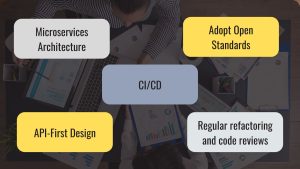Custom Software: Strategies for Designing and Developing
Introduction In a rapidly changing technology landscape, companies are increasingly turning to custom software solutions to meet their unique needs. Developing custom software...

Introduction
In a rapidly changing technology landscape, companies are increasingly turning to custom software solutions to meet their unique needs. Developing custom software is not only about meeting current requirements, but also ensuring that these solutions can scale as the company grows and adapt to future technological changes. In this article, we will explore strategies for designing and developing custom software that prioritises scalability and future readiness while offering long-term value and flexibility.
Understanding Scalability in Custom Software Development
Scalability is the ability of a system to handle increased load without compromising performance. For businesses, this means that their software should be able to grow with them, managing more users, transactions, and data as needed. Achieving scalability when developing custom software involves several key considerations.

- Modular architecture: Designing software with a modular architecture allows different components to be developed, tested, and scaled independently. This flexibility allows developers to optimise performance and make necessary changes without disrupting the entire system.
- Cloud integration: Using cloud services can significantly improve the scalability of a system. Cloud platforms like AWS, Azure, and Google Cloud offer resources that can be dynamically allocated based on demand, ensuring that your custom software can efficiently handle varying loads.
- Database optimisation: Effective database design is critical to scalable software. Using techniques like indexing, partitioning, and sharding can help manage large volumes of data. Additionally, choosing the right database type (SQL or NoSQL) based on the needs of the application can optimise performance and scalability.
- Load Balancing: Implementing load balancers distributes network or application traffic across multiple servers. This ensures that no single server becomes a bottleneck, thereby improving system responsiveness and availability.
Future-Proofing Custom Software: Preparing for Technological Changes
Future-proofing is all about designing software that stays relevant and functional in the face of technological advances and changing business requirements. Here are some strategies to achieve this.

- Microservices Architecture: Adopting a microservices architecture breaks an application into smaller, independent services. This separation makes it easier to update and integrate new technologies without overhauling the entire system.
- API-First Design: Designing APIs first ensures that your software can easily interact with other systems and services. This approach facilitates future integration and makes it easier to adopt new technologies as they emerge.
- Continuous Integration and Continuous Deployment (CI/CD): Implementing CI/CD pipelines automates the testing and deployment process, enabling rapid iteration and integration of new features. This practice helps keep your software up-to-date with minimal disruption.
- Adopt Open Standards: Using open standards and protocols ensures that your software will remain compatible with future technologies. Avoiding proprietary technologies can prevent vendor lock-in and provide greater flexibility for future improvements.
- Regular refactoring and code reviews: Continuously improving the code base through regular refactoring and code reviews ensures that the software remains maintainable and adaptable. This practice helps identify and fix potential issues before they become critical.
Role of Software Development Agencies
Software development agencies play a crucial role in creating scalable and future-proof custom software. Their expertise in various frameworks and development methodologies allows them to develop solutions tailored to specific business needs. Here’s how partnering with a reputable software development agency can benefit your business.

- Expertise and Experience: Agencies bring a wealth of experience in developing scalable and adaptable software solutions. They stay up-to-date with the latest trends and technologies, ensuring that your custom software is built using best practices.
- Dedicated Resources: With a team of experienced professionals, software development agencies can dedicate the necessary resources to effectively manage complex projects. This ensures on-time delivery and high-quality results.
- End-to-end Support: From initial consultation to post-launch support, agencies provide end-to-end services covering all aspects of software development. This holistic approach ensures that your software evolves in line with your business needs.
- Cost-effectiveness: While developing your own software can be expensive and resource-intensive, partnering with an agency can be a cost-effective alternative. Agencies offer scalable engagement models that allow companies to access top-notch talent without the overhead.
Conclusion
In the custom software development space, scalability and future-readiness are critical to building solutions that deliver long-term value. By adopting strategies like modular architecture, cloud integration, microservices, and CI/CD pipelines, companies can ensure that their software will grow with them and adapt to technological advancements. Partnering with experienced software development agencies can further enhance these efforts by providing the expertise and resources needed to navigate the complexities of developing scalable and future-ready software.
Investing in custom software that is designed with scalability and future-readiness in mind not only addresses current challenges, but also positions companies for sustainable success in an ever-changing technology landscape.